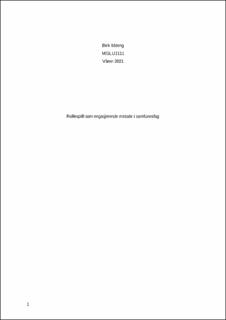| dc.contributor.advisor | Øystese, Martin | |
| dc.contributor.author | Iddeng, Birk | |
| dc.date.accessioned | 2021-09-28T17:48:36Z | |
| dc.date.available | 2021-09-28T17:48:36Z | |
| dc.date.issued | 2021 | |
| dc.identifier | no.ntnu:inspera:80062743:34785913 | |
| dc.identifier.uri | https://hdl.handle.net/11250/2784983 | |
| dc.description.abstract | I denne oppgaven har jeg ved hjelp av støttelitteratur og eget datamateriale, drøftet i hvilken grad rollespill er hensiktsmessig for læring og engasjering i samfunnsfag på barneskolen. Min empiri er hentet fra en anonym spørreundersøkelse jeg har konstruert selv, og er gitt til elever på fjerdetrinn i forbindelse med praksis. Undersøkelsen består av både kvalitative og kvantitative spørsmål. Jeg har valgt å benytte undersøkelse for å gi en stemme til elevene. Jeg har som mål å svare på følgende problemstilling:
I hvilken grad kan rollespill bidra for å fremme engasjement og læring i samfunsfag på barneskolen?
Rollespill er når en person går inn i rollen som en annen person. Dette inkluderer blant annet barnelek og «live action role playing». Rollespill er improvisert, og deltagerne skal sammen løse en konflikt. Den samlende aktiviteten passer godt inn i sosiokulturell- og konstruktivistisk læringsteori ved at elevene får felles erfaringer i en undervisningssituasjon.
En fordel med rollespill er at elever lett blir engasjert, samtidig som aktiviteten kan skape en god relasjon til både læreren og innad i klassen. For å dra nytte av rollespill må læreren ha ne bakgrunnskunnskap og godt forberedt. Det skal nevnes at rollespillet har behov for en etterarbeidsoppgave hvor elevene får reflektert rundt innholdet for de skal lære mest mulig. | |
| dc.description.abstract | In this thesis, I have, with the help of supporting literature and my own data material, discussed the extent to which role play is appropriate for learning and involvement in social studies in primary school. My empirical data is taken from an anonymous survey I have constructed myself, and was given to pupils at year four in connection with my stay at a primary school. The survey consists of both qualitative and quantitative questions. I have chosen to use the survey to give a voice to the students. I aim to answer the following question:
To what extent can role-playing games help to promote engagement and learning in history in primary school?
Role play is when a person enters the role of another person. This includes children's play and "live action role playing". Role play is improvised, and the participants must resolve a conflict together. The unifying activity fits well into socio-cultural and constructivist learning theory in that the students gain shared experiences in a teaching situation.
An advantage of role-playing is that students are easily engaged, at the same time as the activity can create a good relationship with both the teacher and within the class. To benefit from role-playing, the teacher must have background knowledge and be well prepared. It should be mentioned that the role play needs an after-work assignment where the students get to reflect on the content for them to learn as much as possible. | |
| dc.language | nob | |
| dc.publisher | NTNU | |
| dc.title | Rollespill som engasjerende metode i samfunnsfag | |
| dc.type | Bachelor thesis | |
